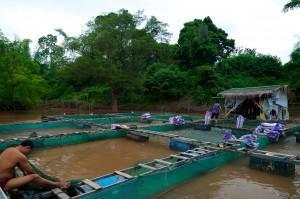 I have discussed factory farms in a previous post. But did you know that factory farms go beyond the normal livestock? Factory farms are now plaguing our oceans and fresh water fish.
I have discussed factory farms in a previous post. But did you know that factory farms go beyond the normal livestock? Factory farms are now plaguing our oceans and fresh water fish.
With the rising demand for seafood and the natural populations being depleted, it only makes sense to start factory farms for fish, right? Maybe instead we should be concerned with the depleting populations or the waste these factory farms produce. We need to come to terms with aquaculture because according to Alternet.org, “With nearly 90 percent of large fish stocks threatened by over-fishing and 3.5 billion people dependent on the seas as their primary food source, these ocean farming advocates have concluded that aquaculture is here to stay.”
The problem with fish farms is they now give their ‘livestock’ antibiotics because they are basing their model off of livestock factory farms. But it doesn’t have to be this way. Small scale farms can be sustainable when, “complementary species are cultivated to provide food and fuel — and to clean up the environment and fight climate change”.
The issues when ocean farms follow livestock factory farm methods are:
- “The waste, which includes excess feed, antibiotics and the chemicals used to treat the cages, flows directly into the ocean and, ultimately, on to our plates.”
- “Escapes from open ocean pens are common, and when farmed fish escape they can compete or interbreed with wild fish, altering natural behavior and weakening important genetic traits. They can also spread disease to wild fish.”
How fish aquaculture can be sustainable:
- Seaweed helps with carbon sequestration. “This turbo-charged growth cycle enables farmers to scale up their carbon sinks quickly.”
- Oysters can absorb nitrogen, this is helpful for the massive amounts of fertilizer being dumped in our waters.
This comes down to the same idea with any food, know where your food comes from and how it was produced. Also as with meat, try to eat less of it. Those are the best ways to make sure your food is sustainable.
[Image source]

